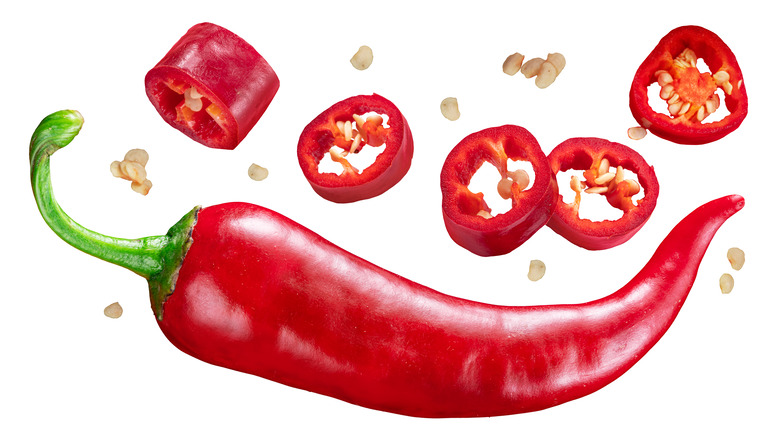The Unexpected Food That Can Help You Treat Blood Clots
Blood circulation is one of the essential jobs your body performs. The Cleveland Clinic illustrates how the circulatory system is one of the body's most critical systems. It carries oxygen from the lungs through the bloodstream to the brain and body tissues, distributes hormones, and feeds nutrients to every organ. When the circulatory system becomes blocked, vital oxygen, nutrients, and chemicals can't get through to the brain, heart, and other organs. According to Vein Clinics of America, diet and nutrition can help keep the circulatory system in optimal condition. And you may be surprised how one incredible food can even help treat blood clots.
Medline Plus explains that blood clots form when proteins, platelets, and blood cells clump together, forming a blockage in blood veins or arteries. Blood clots disrupt circulatory system functioning and can block organs and other body parts from receiving the vital blood flow they need. Depending on where they form, blood clots can cause serious health problems, and if they form in deep veins or arteries connected to the heart or brain, they could potentially be fatal. Fortunately, one unexpected food may help break up blood clots if they develop.
Try adding a little spice to your life
While eating a healthy diet rich in whole foods, beneficial herbs, and spices is a good idea, some specific foods help thin the blood and improve circulation to keep things flowing better than most. WebMD recommends eating fish, whole grains, nuts, healthy fats like olive oil, and plenty of fruits and vegetables to reduce your risk of blood clots. But prevention is not the cure for existing blood clots. If you are one of the approximately 900,000 people per year in the United States who develops serious blood clots, according to data from the Centers for Disease Control and Prevention, consuming cayenne pepper could help break up the blockage and restore healthy circulation. That's because cayenne contains the chemical capsaicin, which may help dissolve blood clots.
A 2018 International Journal of Current Advanced Research (IJCAR) review found that the capsaicin in cayenne has potent anticoagulant and anti-inflammatory properties and that consuming cayenne pepper may prevent platelets from clumping together and forming blood clots. The study finds that cayenne's anticoagulant action may behave similarly to the blood-thinning drug Warfarin. To use this spicy pepper, buy ground cayenne and sprinkle it on healthy food. Or you can chop up whole cayenne peppers to make chili water, chili oil, or salsa. If you don't like spicy food, try a cayenne supplement in a capsule, but make sure to ask your doctor before taking any new supplement.


